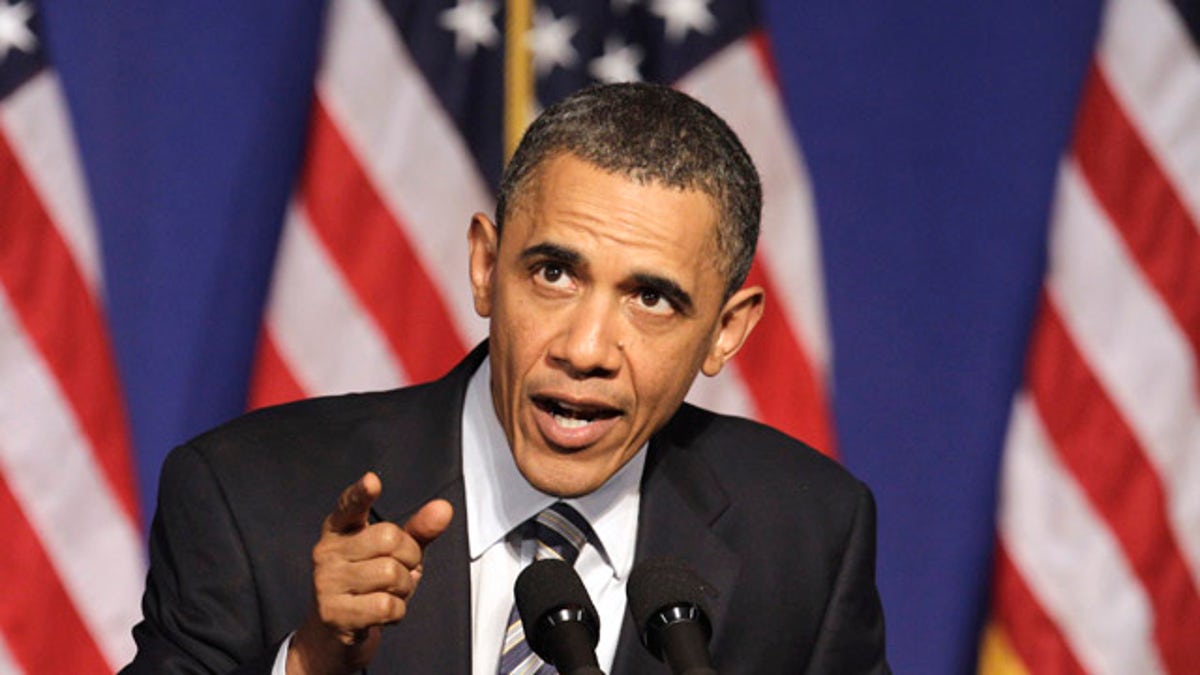
FILE: President Obama warns of damaging debt, if we don't get "our fiscal house in order." (AP)
In the increasingly frantic search for ways to keep the country for facing a financial catastrophe, a foundation challenged six think tanks across the political spectrum to come up with plans to fix the nation's finances, a crisis President Obama recently described.
"Our debt has grown so large that we could do real damage to the economy if we don't begin a process now to get our fiscal house in order,” he said.
The conservative Heritage Foundation is the first to complete a plan, which will be unveiled Tuesday. It calls for sweeping changes in spending, taxes and entitlements.
And Stuart Butler, one of the authors of the plan, warns that without some changes, current policies would require massive tax increases on every American and at every income level.
"The fact is, if we did nothing -- if we just let current programs operate in future as they're designed under current law, tax rates would have to double for all taxpayers," Butler says.
That would also be true for all businesses which he says would have a crushing impact on job creation. To avoid that, Heritage would limit future federal revenues to the modern average of 18.5 percent of the total economy.
"[T]hat's essentially the upper bounds of what Americans have said they're willing to pay for their government,” Alison Fraser, another author of the plan says. “So the way we do that is to build in a strong cap on federal revenues, and we balance spending at that level.”
“So we start by putting a limit, a fixed ceiling on how much money the government takes as well, of course, as a ceiling on spending…," Butler says.
On taxes, the plan would eliminate hundreds of existing tax deductions -- leaving only three: the home mortgage deduction, charitable contributions and other gifts, and a deduction for higher education, seen as an investment in the future.
And a new flat tax would hit only income that is spent, not money that is saved.
"If you have $50 thousand in income and you save $25 thousand of it, you save half of it, you only pay taxes on that other $25 thousand," Fraser explains.
"That will generate an enormous amount of new saving and capital and that means new jobs, and faster growth in this country," Butler adds.
By all accounts, the biggest fiscal problems we face are Social Security and Medicare. As the baby boomers retire, the nation faces tens of trillions in promised benefits that the government cannot pay for.
Though some Democrats, such as Senate Majority Leader Harry Reid, D-Nev., argue there is no urgency, the president acknowledges action is needed.
"I guarantee that if we don't make any changes at all, we won't be able to keep our commitments to a retiring generation that will live longer and face higher health care costs than those who came before," Mr. Obama said.
With that in mind, the Heritage plan would actually increase benefits for the poor, but cut benefits for those better off.
"If you're well off,” says Alison Fraser, "you don't get as much in terms of benefits. You get a smaller social security check or you pay more of your premiums on Medicare."
Benefits start phasing out for a couple with $110 thousand in income, not counting Social Security. And once a couple hits $165 thousand in income, social security checks stop altogether.
"They'd still get their Medicare program, still be able to go to doctor, it's just that they would pay full freight for their Medicare," Butler says.
This is the second conservative plan, after the budget proposed by Wisconsin Republican Paul Ryan, to tilt entitlements toward the poor by using what is called "means testing."
That means those with more get less from the government and, in the Heritage plan, at some income level, the wealthy get no federal financial assistance at all. Heritage decided it is better to curtail benefits for the affluent than it is to continue giving them, only to turn around and raise taxes to pay for them.
And though this plan doesn't raise taxes, it does take great care to preserve benefits for those of modest incomes by taking from the wealthy and giving to the poor.

